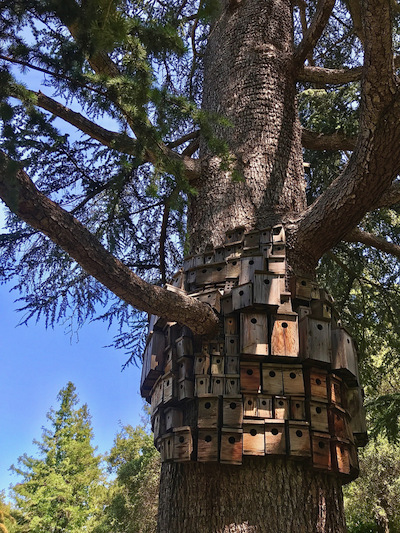
|
|
|
|
|
| Issue 8: | June 2021 |
| Haiku: | 13 words |
| + Visual Art: | Sculpture |
By Gary S. Rosin
[empty]
empty bird boxes
condos curve up this cedar
no songs in the breeze
—After Control Tower sculpture by Cameron Hockenson

Control Tower (2011), an homage to songbirds[1]
(Recycled pine wood, solar panels, delay switch, mic, speakers)
By Cameron Hockenson (1975–2015), in collaboration
with Robert Davis
and Delmar McComb[2] [3]
Environmental sculpture: birdhouse “condominiums” in a cedar tree at
at Montalvo Arts Center (Saratoga, California).
Photograph copyrighted © 2019
by Valerie Archer Wainwright.
All rights reserved. Image reproduced here with her
permission.[1]
*Publisher’s Notes:
1. For details and other photographs, see the article by Valerie Archer Wainwright
in the University of San Francisco Museum blog (02-25-2019): Intern-connectivity: montalvo arts center and an homage to the loss
of songbirds (link retrieved in May 2021).
2. Cameron Hockenson built Control Tower during a three-month-long residency
at Montalvo Arts Center in San Francisco, collaborating with fellow resident, sound
artist Robert Davis, and Montalvo’s Garden Curator, Delmar McComb.
As described by Hockenson: “This condominium for birds attempts interspecies
communication. Cavity-nesting song birds were driven out of Silicon Valley due to
suburban sprawl, and the removal of hollow oak tree snags in back yards, which are
the habitat of nuthatches.
“It seemed right these refugees had a community of their own. It was experimental
to make a communal colony for birds that prefer to live in, and defend solitary nesting
sites. But when compared to human social patterns, it offers up interesting parallels.
The varying hole sizes in this piece invited both song birds and blue-jays, their
gentrifying predators.
“Because of this problem, I worked with Robert Davis, an artist experimenting
with bio mimicry from Goldsmith’s College in London, to make a solar-powered
sound system which detects the pitch and song of cavity nesters and chirps back
air-traffic warnings in Morse code. Montalvo’s Garden Curator, Delmar McComb,
designed a bird garden to provide food and nesting material” (quoted material
is from one of Hockenson’s Instagram links—
https://www.instagram.com/p/BDGY1Z1R-uC/ —retrieved
in May 2021).
3. Photograph above and details about Cameron Hockenson’s art appear here with
permission from his father, Bill Hockenson.
4. For more info and images, see Cameron Hockenson’s Instagram page, which was
still functioning in early June 2021:
https://www.instagram.com/explore/tags/cameronhockenson/
5. See also playwright Claire Willett’s tribute to Hockenson,
Space Between (25 August 2015), which includes
dozens of photographs, many of which are from the sculptor’s now-defunct website.
(Link retrieved in May 2021.)
Gary S. Rosin’s
poetry and haiga have appeared, or are forthcoming, in various literary and poetry magazines such as Concho River Review, Failed Haiku, Harbinger Asylum, KYSO Flash, MacQueen’s Quinterly, Poetry24, The Legal Studies Forum, and Visions International; as well as in several anthologies, including Faery Footprints (Fae Corp Publishing), Lifting the Sky: Southwestern Haiku & Haiga (Dos Gatos Press), Texas Poetry Calendar (Kallisto Gaia Press), Untameable City: Poems on the Nature of Houston (Mutabilis Press), and elsewhere.
His poem “Viewing the Dead” was nominated for a Pushcart Prize. Two of his poems appear in Silent Waters, photographs by George Digalakis (Athens, 2017). He is the author of two chapbooks, Standing Inside the Web (Bear House Publishing, 1990) and Fire and Shadows (Legal Studies Forum, 2008) (offprint).
Selections of Gary’s poetry and photography can be found at his website, 4P Creations: http://4pcreations.com
More on the Web: By, About, and Beyond
⚡ Crossing Kansas by Gary S. Rosin in The Wild Word (7 February 2020); includes audio of the poet reading his poem
| Copyright © 2019-2025 by MacQueen’s Quinterly and by those whose works appear here. | |
| Logo and website designed and built by Clare MacQueen; copyrighted © 2019-2025. | |
|
Data collection, storage, assimilation, or interpretation of this publication, in whole or in part, for the purpose of AI training are expressly forbidden, no exceptions. |
At MacQ, we take your privacy seriously. We do not collect, sell, rent, or exchange your name and email address, or any other information about you, to third parties for marketing purposes. When you contact us, we will use your name and email address only in order to respond to your questions, comments, etc.